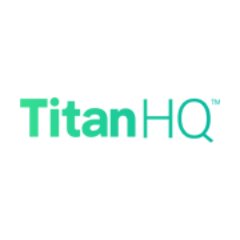What is our primary use case?
Our use case is about protecting our infrastructure. We also restrict certain user profiles, so as a productivity tool it blocks access for general browsing.
How has it helped my organization?
We get two overall benefits: security and productivity.
For security, it is, maybe, a little bit restrictive. But it suits us that we have time to unblock websites. It can be a little bit tricky in that sometimes you need to understand how web frameworks work. You might unblock a website, but there could also be content delivery networks or different frameworks that come from a website, and they need to be blocked as well. It takes a little bit of understanding. But we're happy that it's overly restrictive because we can actually see that WebTitan has saved us a good number of times, occasions when we would have had some type of malware payload delivered, but we have seen that it was blocked.
We've absolutely seen a reduction in malware attacks by using WebTitan. We have confirmed evidence. We can see the blocks of malicious websites. If somebody opens up an attachment and there's a link in it, it's blocking the link. It has done its job. The benefits outweigh the hassle of configuring and maintaining it.
In our company, productivity might stop if there were, for example, a big sporting event coming up. In a manufacturing environment, we don't want people to be tuning into the sporting event. The profiles we have in manufacturing cut their access down to the bare-minimum, essential websites.
What is most valuable?
The basic functionality of blocking access to websites has proven very beneficial.
What needs improvement?
We have never really fully come to grips with the customization options provided by WebTitan. It is a little bit tricky and what happened was that we got it working the way we needed it to work and we just left it at that. But WebTitan do provide all the assistance and support that you need to get it going.
For security, it's very restrictive. For us, it blocks a lot, even too much, so we have had to create exceptions. A new implementation takes a bit of time to train it up, to put in all the exclusions, but once you have that done, it's just a matter of adding things as they come up.
For how long have I used the solution?
I've been using WebTitan for eight to 10 years.
What do I think about the stability of the solution?
It's extremely stable. I would say it's flawless. We did have some concerns that, if it did fail, all internet access would stop for our people because the proxy wouldn't be there. That concern has subsided over the years because it's proven that it doesn't really fail.
What do I think about the scalability of the solution?
We've had to scale up and it's scaled now. We have it on a VM, so we had to add virtual resources, but that was fine. The product itself scales okay.
We currently have 1,500 users and they represent a mix of remote and on site, but they are primarily on site. We don't really need to differentiate between those groups of users because users VPN in, so it's the same model regardless of whether people are on site or remote.
How are customer service and support?
You find out how good a company is through the support that it provides, and over the years, their support has been great. We've only had one or two issues and they were caused due to our site growing. The on-prem appliance wasn't sized for our requirements as a result and there were some knock-on issues.
They were timely and resolved things fast. It was easy to work with them and the communications were clear. We also have a level of trust in them because they have offices here in Ireland, so we have a good relationship with their people.
How would you rate customer service and support?
Which solution did I use previously and why did I switch?
In the past we had Websense Content Gateway and we had McAfee Web Gateway. We were on Websense, then we went to McAfee Web Gateway and we went back to Websense, but it still wasn't any good. They were really at varying levels of "awful." When we moved to WebTitan, it just did what we needed.
The other solutions were just awful to configure and were very limited with what you could do, in terms of the reporting. That was 10-plus years ago, and those products certainly have evolved a lot in a decade.
How was the initial setup?
We did our configurations back in the early days, so maybe it has improved since then, but some assistance on how to configure it might help, some pre-made assistance on how to configure and deploy. But it's good. It's a good tool.
We did it on a trial basis and phased it in. There were three of us involved, although we had one engineer whose project it was, and it took a month or two. Then we started migrating users over to it. We took a cautious approach.
After the initial deployment, it's straightforward. You forget about it really, and it's only when users request that a website be unblocked that you have to work on it. We might have one or two requests a week to unblock a website. In terms of oversight, it's just reviewing the logs periodically to see what's happening. There's no maintenance.
What was our ROI?
The solution hasn't reduced our costs associated with web filtering because we're still using advanced threat protection and we're using URL filtering there as well. WebTitan is part of our suite of defenses. We have protection in place on the client-side as well as on the network, including intrusion detection. It's part of a toolset. I wouldn't say that if you get WebTitan you can get rid of some other things.
But the cost-saving part is in respect to the cost of a breach. It has saved our having to respond to something nasty getting on-premises.
What's my experience with pricing, setup cost, and licensing?
The pricing is good. It's a substantial cost, but they've held their prices over the years, which has been good.
It's a little bit restrictive when it comes to growth because at one stage they were selling additional blocks of 500 and you could end up paying for more than you needed. But overall, it's been fine. I can't complain, given what we get out of it and what we pay for it.
What other advice do I have?
Evaluate from the start, whether you want the on-prem or cloud version. It depends on what industry you're in, and on what your requirements are. We shy away from cloud-based, because there is just too much farce, as a tightly-governed company and with GDPR, et cetera. We've only seen that things have settled down on that front in the last couple of years. Now, there is some solid framework and guidance on how to do this stuff right. By that I mean that the solution holds onto people's browsing history, and that is quite sensitive data.
This issue has nothing to do with the actual product. Companies need to decide for themselves which approach is best for them, understanding that there could be a lot of lengthy policies and procedures and approvals required before you actually even use the product. And that would be true regardless of any proxy software you're considering.
So you need to look at what the right approach is for you, from the start, based on your requirements. I believe the transition from on-prem to cloud is easy.
Overall, I would rate WebTitan at nine out of 10. It dropped a few points with how restrictive it is and because of the issues in getting it configured. But I add a few points back based on the fact that it has saved us numerous times, and that the support and the reporting are quite good.
Which deployment model are you using for this solution?
On-premises
Disclosure: PeerSpot contacted the reviewer to collect the review and to validate authenticity. The reviewer was referred by the vendor, but the review is not subject to editing or approval by the vendor.












